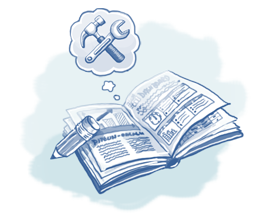As we’ve been covering in earlier articles, computing ROI for a CRM systems is an involved affair. But another way of figuring ROI for CRM would be to put it under the heading of efficiency: how would efficiency be improved for the key areas of the company? For in the end, that’s what CRM is all about—at least it should be.
Sales Customer Relations
Since the sales force is the front line of customer relations, it stands to reason that CRM systems should bring a high degree of efficiency to the sales reps. CRM should empower them to easily track their sales, and know where all of their sales cycles stand, by enabling them to visually see each sale and its current position in the sales process. Since CRM is the singular repository for sales data, any rep needing to take over a sale from another can instantly pick it up with no annoyance to the prospect. Sales management should be able to readily visualize the whole sales process and accurately analyze and forecast sales with ease—without the necessity of constant verbal interaction with salespeople.
The smoothness of such an operation carries through to prospects and customers. An understanding of the prospect is “built-in” to CRM so that the all-important care factor is always present. The likelihood of the close is increased, as is the likelihood that the customer will purchase from your company in the future.
On the company side, the focus can be on profitability; sales that are more profitable can be given priority. The risk of less profitable sales is lessened, the risk of losing sales due to inefficiency, nill.
 Sales Administration
Sales Administration
When CRM systems are implemented there is always training time—which means a degree of downtime or at least slowed production for sales. For traditional CRM applications, this training can go on for months, and in some respects may continue indefinitely. Today’s leading-edge CRM systems can be trained in on reps in a matter of hours or—at the most—days.
Another aspect of efficiency to examine is sales administrative time. That is, the amount of time spent by sales reps inputting data into the CRM systems, the amount of time spent retrieving that data, and (a big irritant for salespeople universally) the extra hours spent having to create reports. A CRM solution should shave considerable time off of each of these functions if it is to really return on the company’s investment.
Of course each of the above points for Sales impacts yet another issue: will the CRM solution be adopted by salespeople? If it is too complex or too time-consuming for them, in the end, they’ll quietly resort to their own solutions such as individual notes or spreadsheets. In such a case the ROI for CRM systems has, maybe even secretly, went right out the window.
CRM Systems and the IT
Traditionally CRM systems have been chosen by IT, approved by management, and then implemented without much consultation with other key areas of the company. In an interesting case of “karma” the ramifications of this lack of research most often kicks back on IT. IT staff are having to spend many extra hours, days and weeks training users, coaxing users to actually use the CRM system, and “tweaking” it to make it more user-friendly or more conforming to the company business model.
If the full spread of research on a potential CRM systems ROI is done to begin with, IT efforts to get them implemented after the fact will be minimal.
When evaluating CRM tool ROI, it all comes back to efficiency. When taken fully into account, that efficiency will translate to increased profits more smoothly brought about. And in business that’s the name of the game.
Learn how efficient a CRM solution can truly be. Sign up for one of our free webinars.




















